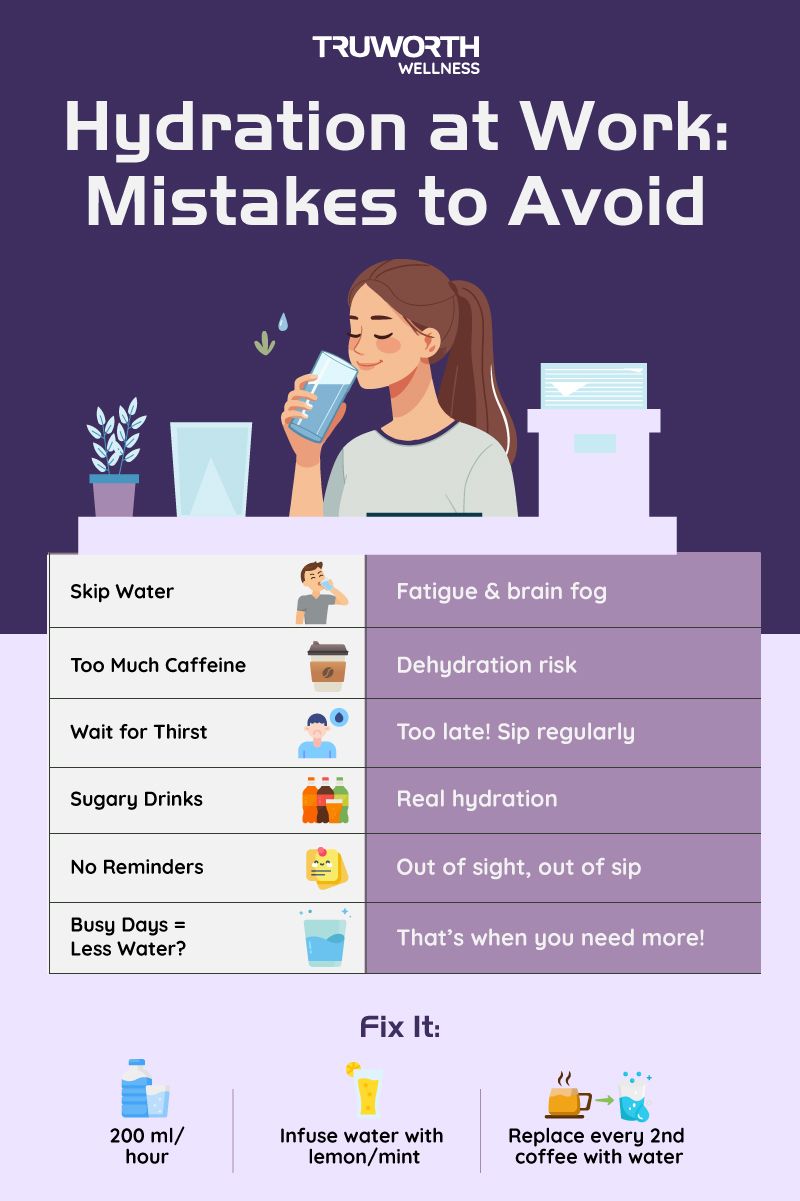Hydration Mistakes You're Probably Making At Work

Water. It’s the one thing we all know we need more of, yet it’s often the first thing we forget, especially during busy workdays. Between back-to-back meetings, tight deadlines, and screen fatigue, proper hydration often slips to the bottom of the to-do list.
But here's something many professionals overlook: even mild dehydration (just 1–2% loss of body water) can affect your focus, memory, energy levels, and even your mood. And in a corporate environment where mental clarity and productivity are essential, hydration isn’t just a wellness bonus—it’s a performance tool.
Let’s explore some of the most common hydration mistakes employees make at work—and how a few smart shifts can help you feel more energized, clear-headed, and physically balanced throughout the day.
Water Before Bed: Is It A Good Or Bad Habit?

1. Starting Your Day with Only Coffee
The mistake:
You wake up, skip water, and begin your day with a steaming cup of coffee—or two.
Why does it matter?
After 7–8 hours of sleep, your body is naturally dehydrated. Starting your day with caffeine, a mild diuretic, can worsen fluid loss and leave you feeling sluggish, irritable, or foggy by mid-morning.
Fix it:
Start your morning with a full glass of water (room temperature or warm), ideally with a pinch of salt or a splash of lemon. Rehydrate before caffeinating—it’s a game-changer for morning clarity.
2. Drinking Water Only When You're Thirsty
The mistake:
You wait to feel thirsty before reaching for your water bottle.
Why does it matter?
Thirst is a delayed signal. By the time it kicks in, you may already be mildly dehydrated. Office ACs and screen-heavy environments can suppress thirst cues, making this mistake even more common.
Fix it:
Don’t wait. Sip small amounts frequently throughout the day. Keep a water bottle visible, use hydration reminder apps, or link drinking water to habits (like after meetings or phone calls).
3. Forgetting That AC Can Dehydrate You
The mistake:
You assume you’re fine because you’re not sweating.
Why does it matter?
Air-conditioned environments often reduce humidity, pulling moisture from both the air and your skin. This hidden dehydration can leave you with dry eyes, fatigue, and a lack of focus.
Fix it:
Hydrate regularly—even if you're not hot or sweaty. Indoor plants or desktop humidifiers can also help balance moisture in the air around you.
4. Confusing Caffeine and Hydration
The mistake:
You count coffee and tea as part of your daily fluid intake.
Why does it matter?
While they contain water, caffeine in high amounts can increase urine output and contribute to dehydration, especially when consumed without balancing water intake.
Fix it:
Limit caffeine to 2–3 cups daily. Follow each cup of coffee with a glass of water. Herbal teas, coconut water, or lemon water make great low-caffeine alternatives.
10 Non-Caffeinated Ways To Boost Your Energy At Work
5. Sticking to a One-Size-Fits-All Water Goal
The mistake:
You follow a rigid “8-glasses-a-day” rule regardless of your day.
Why does it matter?
Your hydration needs vary based on your activity, diet, climate, and stress levels. A one-size-fits-all approach can fall short or lead to overhydration.
Fix it:
Be intuitive. Increase intake on active days, during intense work sessions, or when under stress. A good marker? Aim for light yellow urine and minimal dry mouth.
6. Relying Only on Bottled or Packaged Water
The mistake:
You avoid office water dispensers due to taste or quality concerns and skip drinking altogether.
Why does it matter?
If you’re limiting water intake because of its source or taste, you're compromising your hydration consistently.
Fix it:
Bring a portable filtered bottle, or flavor your water with lemon, mint, or cucumber slices. If possible, encourage your workplace to invest in clean water infrastructure.
7. Skipping Water During Meals
The mistake:
You believe drinking water during meals disrupts digestion, so you avoid it.
Why does it matter?
This is a myth. Moderate water during meals aids digestion, especially when you're sedentary for long hours afterward.
Fix it:
Sip water during meals, especially if your food is salty or dry. Avoid guzzling, but don’t hold back either—hydration supports your gut health.
8. Ignoring Water-Rich Foods
The mistake:
You think hydration is only about how much water you drink.
Why does it matter?
Many fruits and vegetables are over 80% water and contribute significantly to your hydration. A water-only mindset ignores these hidden sources.
Fix it:
Incorporate water-rich foods like cucumbers, oranges, strawberries, yogurt, soups, and leafy greens into your meals and snacks.
9. Treating Hydration as a Last-Minute Fix
The mistake:
You ignore water all day, then try to "catch up" in the evening.
Why does it matter?
Suddenly, drinking large volumes doesn’t hydrate you efficiently. It can lead to bloating or disrupt your sleep with late-night bathroom runs.
Fix it:
Hydration works best when it’s consistent. Set a goal to sip throughout the day. Keep a water bottle close and refill it every 2–3 hours.
10. Ignoring the Mind-Body Hydration Connection
The mistake:
You feel tired, foggy, or anxious and assume it’s all work-related stress.
Why does it matter?
Even slight dehydration can impair cognitive function and mood. It’s often misinterpreted as burnout or emotional fatigue.
Fix it:
Make it a habit to drink water when you feel off. Many professionals report better mood, focus, and productivity with just a small hydration upgrade.
Also Read: Drinking Water For Workplace Success
Bonus Tip: Use Visual Triggers
The mistake:
You rely solely on memory to stay hydrated.
Why does it matter?
If your water bottle isn’t visible, it's easier to forget. Out of sight truly is out of mind.
Fix it:
Use a bright-colored bottle, place it near your screen, or use sticky note cues. You can even mark times on your bottle to pace your intake.
Final Thoughts
Hydration is more than a physical need—it's a performance enhancer, mood stabilizer, and wellness booster. In a corporate world that demands your focus, creativity, and emotional balance, staying hydrated helps you function at your best.
The good news? You don’t need expensive solutions, apps, or hydration powders. Just awareness, consistency, and a few small daily upgrades can make a world of difference.
Want to Build Smarter Hydration Habits?
Use workplace wellness platforms like The Wellness Corner by Truworth Wellness to:
✔️ Track your daily hydration
✔️ Set realistic reminders
✔️ Get personalized tips based on your lifestyle
✔️ Join team wellness challenges for better hydration goals
When it comes to staying sharp, energized, and balanced at work, hydration is one habit that always pays off.